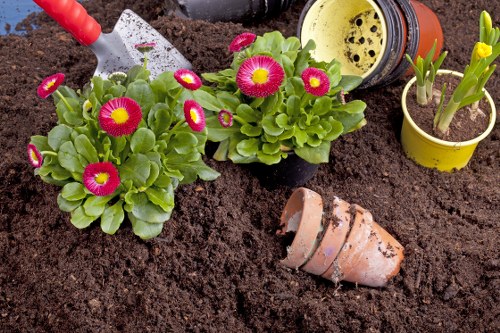Effective Oil Stain Removal for Driveways in Clapham

Understanding Oil Stains on Driveways
Oil stains on driveways are a common issue faced by many homeowners in Clapham. Whether it's from vehicle leaks, accidental spills, or routine maintenance, these stains can mar the appearance of your driveway and potentially damage the surface if not addressed promptly.
Clapham's busy streets and numerous vehicles contribute to the prevalence of oil stains. Understanding the nature of these stains is the first step in effectively removing them.
Oil stains are typically composed of petroleum-based substances that penetrate the porous material of driveways, making them stubborn to remove without the right approach.

Why Timely Removal is Crucial
Neglecting oil stains can lead to long-term damage to your driveway. Over time, oil can erode the surface, leading to cracks and deterioration that may require costly repairs or replacement.
Additionally, oil stains can create a slippery surface, posing safety hazards for you and your family. Timely removal not only preserves the aesthetics of your driveway but also ensures its longevity and safety.
In Clapham, where weather conditions can vary, proactive maintenance against oil stains becomes even more essential to prevent further damage.

Top Methods for Oil Stain Removal
1. Absorb the Excess Oil
As soon as you notice an oil spill, it's important to absorb as much as possible. Use materials like cat litter, baking soda, or sawdust to soak up the excess oil. Sprinkle it generously over the stain and let it sit for several hours before sweeping it away.
Steps to Follow:
- Cover the stain with an absorbent material.
- Allow it to sit to absorb the oil.
- Sweep and dispose of the material properly.
2. Use a Degreaser
Degreasers are specially formulated to break down oil and make it easier to remove from surfaces. Apply the degreaser to the stained area, following the product instructions, and scrub with a stiff brush to lift the oil.
Tips for Using Degreasers:
- Choose a degreaser suitable for your driveway material.
- Wear protective gloves when handling chemicals.
- Rinse thoroughly after application.

Advanced Cleaning Techniques
3. Pressure Washing
Pressure washing is an effective method for removing stubborn oil stains. The high-pressure water jets can penetrate deep into the driveway surface, dislodging oil and grime. It's important to use the correct pressure settings to avoid damaging the driveway.
Benefits of Pressure Washing:
- Thorough cleaning without harsh chemicals.
- Restores the driveway's original appearance.
- Quick and efficient method.
4. Poultice Application
A poultice is a paste-like substance that can draw oil out of the driveway material. Mix ingredients like baking soda, dish soap, and water to form a thick paste, apply it to the stain, and cover with plastic wrap. Let it sit for 24 hours before removing.
Steps for Poultice Application:
- Mix poultice ingredients to form a paste.
- Apply the paste to the oil stain.
- Cover and let it sit to absorb the oil.
- Remove the poultice and rinse the area.

Preventive Measures to Avoid Future Stains
Preventing oil stains is just as important as removing them. Implementing simple preventive measures can save you time and effort in the long run.
- Regularly inspect and maintain your vehicles to prevent leaks.
- Use drip trays under vehicles prone to leaking oil.
- Seal your driveway to create a barrier against oil penetration.
- Promptly clean any spills to prevent staining.
Sealing Your Driveway
Applying a high-quality sealant to your driveway can protect it from oil and other stains. Sealants create a protective layer that makes it difficult for oil to penetrate the surface, making future cleanups easier.
Benefits of Sealing:
- Protects against oil and chemical stains.
- Enhances the appearance of your driveway.
- Extends the lifespan of the driveway material.
Local Services in Clapham
If DIY methods are not yielding the desired results, consider hiring professional oil stain removal services in Clapham. Local experts have the tools and expertise to effectively eliminate oil stains and restore your driveway.
Professional services can provide comprehensive cleaning, sealing, and maintenance solutions tailored to your specific needs.
Choosing a reputable service ensures that the job is done efficiently and to a high standard, giving you peace of mind and a spotless driveway.
Nearby Areas to Clapham for Oil Stain Removal
- Balham: Just north of Clapham, Balham offers quick access to oil stain removal services with a range of local providers.
- Teddington: Southwest of Clapham, Teddington residents can benefit from specialized driveway cleaning solutions.
- Wandsworth: East of Clapham, Wandsworth has numerous professionals skilled in removing oil stains.
- Putney: South of Clapham, Putney offers effective oil stain remediation services for homeowners.
- Stockwell: Close to Clapham, Stockwell residents have access to top-notch driveway cleaning experts.
- Earlsfield: Northwest of Clapham, Earlsfield provides reliable oil stain removal options.
- Tooting: Southeast of Clapham, Tooting offers comprehensive solutions for driveway maintenance.
- West Dulwich: Adjacent to Clapham, West Dulwich has trusted services for oil stain elimination.
- South Lambeth: Directly east, South Lambeth residents can easily find professional cleaners.
- Loughborough Junction: Northeast of Clapham, this area boasts skilled technicians for stain removal.
- Sutton: Further afield, Sutton offers additional options for driveway cleaning.
- East Sheen: Nearby, East Sheen residents can access quality oil stain removal services.
- Kensington: Although slightly further, Kensington provides premium driveway maintenance services.
- Fulham: Close by, Fulham offers effective solutions for maintaining a clean driveway.
- Camberwell: To the west, Camberwell has experienced professionals for stain removal.
Choosing the Right Method for Your Driveway
Selecting the appropriate oil stain removal method depends on several factors, including the type of driveway material, the extent of the stain, and your personal preferences regarding DIY versus professional services.
Consider the following when choosing a method:
- Driveway Material: Different materials like concrete, asphalt, or pavers may require specific cleaning techniques.
- Stain Severity: Light stains might be removable with simple DIY methods, while severe stains may need professional intervention.
- Time and Effort: DIY methods can be time-consuming but cost-effective, whereas professionals offer quicker, more efficient solutions.
Advantages of DIY Methods:
- Cost savings on labor.
- Control over the cleaning process.
- Flexibility in choosing cleaning products.
Benefits of Hiring Professionals:
- Expertise and specialized equipment.
- Guaranteed results with minimal effort.
- Comprehensive services, including sealing and maintenance.
Maintaining a Stain-Free Driveway
Maintaining your driveway involves regular inspections and prompt action when stains occur. By staying proactive, you can prevent minor stains from becoming major issues.
- Regularly sweep your driveway to remove debris that can trap oils.
- Promptly clean up spills to prevent oil penetration.
- Seal your driveway every few years to protect against stains and weather damage.
- Monitor your vehicles for leaks and address them immediately.
Seasonal Maintenance Tips:
- Spring: Inspect for winter damage and clean any new stains.
- Summer: Maintain sealant and address any fresh oil spots.
- Autumn: Prepare for colder weather by ensuring your driveway is clean and sealed.
- Winter: Protect your driveway from salt and potential oil spills.
Environmental Considerations
When removing oil stains, it's important to consider the environmental impact of the cleaning methods you use. Opt for eco-friendly products and proper disposal of oil-contaminated materials to minimize harm to the environment.
- Choose biodegradable and non-toxic cleaning agents.
- Avoid using excessive chemicals that can runoff into storm drains.
- Dispose of used absorbents and cleaning materials according to local regulations.
Eco-Friendly Cleaning Solutions:
- Baking soda and vinegar mixtures.
- Enzyme-based cleaners that break down oil naturally.
- Plant-based degreasers that are safe for both your driveway and the environment.
Proper Disposal Practices:
- Contain and bag oil-soaked materials securely.
- Take them to designated disposal sites.
- Never dispose of oil-contaminated materials in regular trash or waterways.
Conclusion
Oil stain removal on driveways in Clapham is a manageable task with the right knowledge and tools. Whether you choose DIY methods or hire professionals, maintaining a clean driveway enhances the curb appeal and longevity of your property.
By understanding the causes of oil stains, implementing effective removal techniques, and taking preventive measures, you can keep your driveway looking spotless year-round.
Remember to consider local services in nearby areas for additional support and expertise, ensuring your driveway remains in top condition.
Frequently Asked Questions
1. What is the best DIY method for removing oil stains from a concrete driveway?
The best DIY method involves using an absorbent material like baking soda to soak up excess oil, followed by scrubbing with a degreaser and water. This combination effectively lifts and removes the stain.
2. How often should I seal my driveway to prevent oil stains?
It is recommended to seal your driveway every 2-3 years. Regular sealing creates a protective barrier that helps prevent oil and other stains from penetrating the surface.
3. Can pressure washing damage my driveway?
When used correctly, pressure washing is safe for most driveway materials. However, using too high a pressure setting can cause damage, so it's important to adjust the pressure based on your driveway type.
4. Are professional oil stain removal services worth the cost?
Yes, professional services offer expertise and specialized equipment that can effectively remove stubborn stains and provide long-lasting results, making them a worthwhile investment for maintaining your driveway.
5. How can I prevent oil stains from recurring on my driveway?
Prevent recurring oil stains by regularly inspecting your vehicles for leaks, promptly cleaning spills, using drip trays, and sealing your driveway. These proactive measures help minimize the chances of oil penetration.


